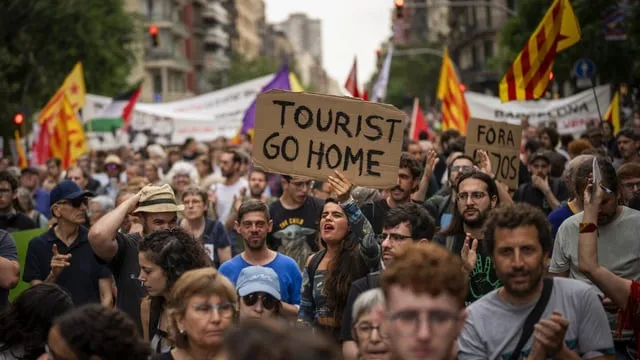Spain Takes a Stand Against Unregulated Holiday Rentals
In a bold move to regulate the booming short-term rental market, the Spanish government has ordered Airbnb to block approximately 65,000 listings that are in violation of local rental regulations. This significant decision reflects ongoing tensions between local authorities, residents, and platforms like Airbnb, as Spain grapples with the impacts of tourism on its housing market and community integrity.
The Background of Airbnb in Spain
Spain has long been one of the top destinations for international tourists, known for its rich culture, beautiful landscapes, and vibrant cities. The rise of platforms like Airbnb has reshaped the hospitality landscape, offering travelers affordable and diverse accommodation options. However, this growth has not come without consequences.
As rental prices soar in major cities such as Barcelona and Madrid, local residents have decried the proliferation of short-term rentals that take away much-needed housing stock. In response, municipal governments across Spain have instituted regulations to limit the growth of these listings and ensure compliance with local laws.
Understanding the Regulations
The crackdown on Airbnb listings is rooted in a series of regulations implementing stricter controls on holiday rentals. In many regions of Spain, property owners must obtain licenses to legally rent out their homes to tourists. These regulations often require compliance with specific safety, sanitation, and noise control standards intended to protect both guests and neighbors.
Additionally, many local governments levy taxes on short-term rentals to ensure they contribute to municipal revenue, which helps fund public services that support the tourism economy. Failure to secure the necessary licenses, and to adhere to these regulations, can result in significant fines and the discontinuation of rental activities.
The Recent Enforcement Action
As part of a wider initiative to regulate the short-term rental market, Spain’s government identified thousands of Airbnb listings that fail to comply with local laws. After thorough inspections and analyses, authorities issued the directive for Airbnb to block around 65,000 listings, marking a substantial enforcement action against non-compliant rentals.
The government’s decision has garnered varying reactions. Proponents of the crackdown argue that regulating the rental market is essential to alleviating housing shortages, maintaining neighborhood integrity, and ensuring that local residents are not displaced by rampant tourism. On the other hand, critics of the decision worry that it could stifle tourism and damage the livelihoods of many property owners relatively dependent on income from short-term rentals.
Implications for Hosts and Tourists
This enforcement action will have immediate implications for many Airbnb hosts. Those operating without the required licenses may need to cease their rental activities or navigate the lengthy process to apply for permits. The directive could lead to a significant loss of income for hosts who have derived a primary source of revenue from short-term rentals.
For travelers, this regulatory measure might limit accommodation options in popular tourist destinations. Airbnb typically offers a range of price points and unique experiences that traditional lodgings may not match. However, the crackdown could also improve standards among remaining listings, ensuring that guests enjoy safe and compliant stays.
Government Perspective on the Ruling
The Spanish government has expressed that this initiative is designed to support sustainable tourism practices. Spain’s tourism industry is vital for its economy; however, unchecked growth in the short-term rental market poses significant risks.
With a goal of balancing the tourism-driven economy with the needs of local residents, officials argue that such regulatory measures are necessary in maintaining affordable housing and protecting the quality of life for inhabitants of their cities.
The Broader Impact on the Airbnb Model
This action taken by Spain is a continuation of a trend observable in cities globally, where local governments are increasingly scrutinizing and regulating Airbnb operations. From New York City to Paris, cities are examining how short-term rentals impact local housing markets and the overall fabric of the community.
Airbnb has faced similar crackdowns in other locations and is actively working to adjust its business model to comply with local regulations. This proactive approach includes partnering with cities and transparency initiatives to provide information about rental licenses. However, the challenge of enforcing compliance remains significant, often leading to conflicts between platforms, hosts, and local governments.
Residents Rallying for Change
Local communities have taken steps to raise their voices against the uncontrolled growth of short-term rentals. Residents in cities with a high concentration of short-term rentals have organized protests, advocating for more comprehensive laws that regulate property rentals, arguing that local housing should prioritize residents’ needs over tourist demands.
As these tensions continue, it is vital for citizens, property owners, and local governments to converge on solutions that can reconcile the dynamics between tourism and the foundational needs of neighborhoods. Collaborative dialogues between all stakeholders—the government, tourist industries, and residents—are essential in exploring sustainable models of Airbnb that prioritize local communities while still accommodating tourism.
What’s Next for Spain and Airbnb
The directive to block 65,000 listings is just one of many steps Spain is taking to manage its tourism and housing balance. As local governments continue to enforce regulations, Airbnb’s ability to operate within Spain will depend on how effectively it collaborates with authorities to ensure compliance.
In the immediate future, many hosts will face challenges in navigating the licensing process, and tourists could experience a shift in accommodation availability. The holistic view is that the enforcement will likely evolve, with close monitoring needed in the coming months to assess its impacts on both the short-term rental market and the broader tourism economy.
Conclusion
The decision to block 65,000 holiday rental listings marks a pivotal moment for Spain’s regulatory landscape, setting a precedent that could influence how short-term rentals are managed throughout Europe and beyond. With tourism remaining a cornerstone of the Spanish economy, aligning the interests of residents and tourists is more crucial than ever.
As this ongoing conversation unfolds, the balance between protecting community interests and fostering economic growth will define the future relationship between platforms like Airbnb, local residents, and the tourism sector in Spain.







